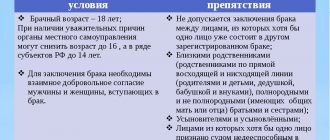The principle of monogamy
Like any other area of law, family law has a number of fundamental principles. These principles are imperative in nature, and their non-compliance entails the invalidity of legal relations.
Family law is endowed with the principle of monogamy. This principle has the second name of monogamy. It lies in the lack of legal possibility of registering a marriage between persons already married to other subjects of legal relations. This principle also applies if only one participant in an already registered marriage union acts as a person wishing to marry.
Provisions of Art. 14 of the RF IC determines the possibility of concluding such a marriage only if a document indicating the dissolution of the previous union is presented to the registry office. This could be a court decision, a document confirming the death of the second spouse, or a certificate of divorce.
Violation of the principle of monogamy refers to the concept of “circumstances preventing marriage.”
What are the grounds for the ban?
Article 14 of the RF IC provides a list of grounds for refusal to register a marriage; it is exhaustive. If the registry office indicates other reasons preventing the marriage, its actions are unlawful.
Between relatives
Between whom along the family line is a union not allowed?
In Russia, marriages between close relatives are prohibited. What prevents this? This is justified by the following reasons:
- medical and biological: the risk of having children with various pathologies and abnormalities in such unions is much higher than in ordinary families;
- moral and ethical: society has a negative attitude towards marriages between relatives; such a union will not be accepted by others and can provoke a conflict situation.
Marriages between distant relatives (for example, uncle and niece, cousins), although undesirable from the point of view of the health of the offspring, are not prohibited by law.
It is strictly forbidden to enter into an alliance between the following close relatives:
- blood relatives in the ascending line (parents, children);
- descending line (grandparents, grandchildren);
- full-blooded (common father and mother) and half-blooded (only one of the parents is common) brothers and sisters.
Is a union between an adoptive parent and an adopted child allowed?
Marriages between adoptive parents and adopted children are prohibited because they are subject to the same restrictions as marriages between relatives in the direct ascendant line. This prohibition is of a moral and ethical nature, since the relationship between adopted children and adoptive parents must comply with generally accepted norms of interaction between children and their parents.
However, marriages between relatives of adoptive parents and relatives of adopted children are not prohibited by law.
With teenagers under 16 years of age
A union cannot be concluded between persons one of whom is under 16 years of age.
According to Article 13 of the RF IC, only people who have reached the age of consent, which is 18 years, can marry, but in some cases it can be reduced to 16 years.
To lower the age of marriage there must be a valid reason approved by the local executive authority. A specific list of such reasons is not specified in the law, since life situations vary.
In some regions of the Russian Federation, the minimum age for marriage is less than 16 years. For example, in Vladimir, Kaluga, Vologda, Samara, Moscow, Rostov and Tula, the regional councils of deputies have legally approved the minimum age for marriage under exceptional circumstances - 14 years.
Valid reasons for such a marriage may be the following:
- the birth of a child or the pregnancy of the bride;
- a real threat to the life of one of the newlyweds;
- orphanhood of the bride and groom and their lack of legal guardians.
In each individual subject of the Russian Federation, legislative acts may approve other grounds for reducing the minimum age of people entering into a marriage.
We invite you to watch a video about at what age you can get married in Russia:
We discussed in more detail the question of at what age it is legal to marry in the Russian Federation in a special material.
If a person is already married
If one of the newlyweds is legally married, then this circumstance is a clear obstacle to concluding a new union. In order to remarry, a citizen of the Russian Federation is obliged to dissolve the previous union in the manner prescribed by law.
If this does not happen, then the marriage is valid. And since in Russia, as in other civilized countries of Western Europe, family legislation is based on the principles of monogamy, it will not be possible to create a new family without divorcing your previous spouse.
Due to incapacity
Marriage is impossible between citizens if one of them is declared incompetent due to a mental disorder. The procedure for recognizing incapacity is regulated by the Civil Code of the Russian Federation.
According to Art. 29 of the Civil Code of the Russian Federation, a citizen is incompetent if he cannot control his actions and understand their meaning. This means that he is not able to consciously express his desire to get married.
Same-sex marriage ban
Same-sex marriage in Russia is an officially unrecognized legal event. State registration authorities will not be able to enter into marriage between persons of the same gender.
Today, there is no legal regulation of the personal non-property and property rights of such couples and, in addition, there are no legal methods for conducting the adoption procedure by same-sex persons.
Violation of the principle of same-sex marriage also refers to the concept of “circumstances preventing marriage.”
The presence of incapacity of one of the persons entering into marriage
That is, a person who has been declared legally incompetent (Article 25 of the Civil Code of the Russian Federation) cannot marry.
- Where is the ban? In the fifth paragraph of Article 14 of the Family Code of the Russian Federation.
- Why? The fact is that a person declared incompetent due to a mental disorder cannot understand the meaning of his actions and manage them, including consciously making a decision about marriage. The institution of marriage in Russia, based on the principle of voluntariness, presupposes a full understanding of the meaning of their actions by persons entering into marriage, and therefore the lack of such understanding is an obstacle.
Marriages between close relatives
Provisions of Art. 15 of the RF IC are an imperative norm that directly prohibits the registration of marriage between close relatives, that is, they relate to the concept of “circumstances preventing marriage.”
Refusal from the registration authorities will be received by persons who are relatives.
The legislator limits the possibility of persons in direct ascending and descending relationships to enter into family relationships.
Marriage cannot be concluded between: a parent and a child; grandparents and their grandchildren; brother and sister with a full or half blood relationship.
The primary reason for the emergence of this legislative norm is the likelihood of children with developmental defects, which is associated with incest. Historical facts indicate the presence of hereditary diseases in children whose parents are closely related.
The most important aspect in these legal relations is assigned to the moral and ethical side.
Why are intermarriages prohibited?
Marriage between persons who are closely related is impossible. The registry office will refuse such a legal act. Its representatives will justify their refusal by the existence of a regulatory provision established by Article 15 of the UK. On its basis, marriage cannot be concluded between those relatives who are in direct ascending or descending kinship. These include: parents and children; grandparents and grandchildren; full and half-brothers and sisters.
Genetic studies have proven that offspring produced by relatives have a large number of diseases in the field of genetics. The reason for this is incest. In most countries, such marriages are also prohibited by the church. Russian legislators see in marriage and family relations that arise between close relatives a breakdown in moral and ethical foundations.
The presence of the fact of adoption between persons wishing to marry
In other words, the adoptive parent and the adopted child cannot enter into marriage.
- Where is the ban? In the fourth paragraph of Article 14 of the Family Code of the Russian Federation.
- Why? The fact is that in a legal sense, adoptive parents are equal to parents in terms of the rights and responsibilities that apply to the adopted child. This prohibition, although not conditioned by the presence of consanguinity between persons entering into marriage, can, according to the logic of the legislator, be classified as a ban on marriage between close relatives. This obstacle to marriage corresponds to both formal legal and moral and ethical norms of Russian society.
States where same-sex unions are legal
Same-sex marriage has been legalized in 20 countries around the world. The largest number of such unions are registered in the UK and Mexico.
It is not possible to register a same-sex marriage throughout Costa Rica. There are still controversial opinions about this legal institution.
Since 2001, official permission to enter into same-sex marriages has been received in the Netherlands, and since 2015 - in the USA.
A large number of countries are opposed to same-sex marriage at the legislative level.
Responsibility for data concealment
If the newlyweds deliberately concealed from the registry office the presence of obstacles to marriage, this is grounds for declaring the union invalid from the moment of registration.
The registry office employee warns citizens about the responsibility for concealing obstacles to marriage at the stage of submitting an application. Also, future spouses have the right to know about each other’s health status. If one of them hid serious illnesses from the other (for example, positive HIV status), then the marriage may be declared invalid in court.
Obstacles to entering into a legal marriage, which are approved at the legislative level, have quite logical justifications and are dictated by concern for the health of future citizens of the Russian Federation. There is no point in trying to circumvent the law in this matter; as a result, the lie will sooner or later be exposed, and the marriage will be declared illegal.
If you find an error, please select a piece of text and press Ctrl+Enter.
Countries that have banned same-sex marriage
There are 60 countries in the world where same-sex marriage is prohibited. Particularly cruel treatment of persons involved in same-sex relationships is observed in Third World countries, where both prison terms and the death penalty can be used as legal punishment.
The largest number of countries that have banned same-sex marriage are Muslim.
As for Russia, there is no direct ban, but it is impossible to register a marriage between representatives of the same sex. First of all, this circumstance is connected with the very definition of marriage established by the UK. According to its norms, marriage is understood as the union of a man and a woman. It is this definition that completely excludes the presence of official same-sex marriage and family relations.
Author of the article
With persons who do not have Russian citizenship
People permanently residing on the territory of the Russian Federation, but for some reason do not have any citizenship, have the right to marry, in accordance with Russian legislation. But at the same time, the presence of citizenship of the future spouse is not the basis for automatically obtaining citizenship; it can only simplify the procedure for admission to citizenship.
From our special publications you can also learn:
- What documents will be needed for registration?
- How much is the state duty and how to pay it?
- How does a surname change happen?
- What are the features of registering relationships during pregnancy?
- How to marry a prisoner?
Conditions for registering a marriage
Marriage has not only symbolic, but also legal significance. From the moment the union is concluded, certain responsibilities and marital rights arise between two people. If you decide to enter into a formal union, you must remember that this relationship will be lifelong unless the marriage is dissolved or annulled. Free expression of will is also a prerequisite; according to the legislation of the country, no one has the right to force a citizen of the Russian Federation to join an official union. The parties entering into official relations have equality, since in the Russian Federation it is prohibited to restrict persons on religious and racial grounds.
According to the new legislation, the bride and groom must inform each other about their state of health and undergo a mandatory medical examination. If one of the couple hid his serious illness, this circumstance makes marriage impossible. You can undergo a medical examination voluntarily or by receiving an appropriate referral from the registry office.
If the union is concluded with a foreign citizen, all his documents, including his passport, if it is in another language, must be translated and notarized. It will be interesting to know that sometimes a document concluded in one country can be declared invalid in another, so it is better to register the relationship in the country where the couple plans to live in order to avoid a number of problems.
The law does not prohibit marriage with citizens who are in prison. They have the same rights as ordinary citizens with the exception of the ability to personally apply and visit the wedding palace. The marriage ceremony will take place in a correctional facility.
Russian citizens who are outside the Russian Federation can get married at the Consulates and Representative Offices of our country in the state where they reside. The principle of considering and submitting an application for marriage registration will be the same as in the Russian Federation.
Who can file a claim?
An application may be written by a conscientious spouse, an incapacitated person (upon his recovery and restoration of legal capacity), a guardian, a guardianship authority, a prosecutor and other persons whose rights have been violated by the creation of such a union. The latter should be understood as children’s sisters, brothers and other relatives who apply for a pension, inheritance, and so on.
Important point
If the recognition of incapacity took place after marriage, then such a union cannot be declared invalid. This fact will be the basis for divorce at the initiative of one of the spouses. If a person who suffers from a mental illness, but has not yet been declared incompetent by a court, gets married, the union can be dissolved in a general manner at the request of this citizen or guardian. The reason in this case will be a vice of will, that is, a violation of voluntary consent provided for in Art. 12, paragraph 1 SK. Limitation of legal capacity established as a result of drug or alcohol abuse will not be an obstacle.
Concept and form of marriage
The law does not contain a definition of marriage. Analysis of the norms of the RF IC regulating the conditions and procedure for concluding marriage, as well as its legal consequences, allows us to identify the main features of marriage, on the basis of which marriage can be defined as a voluntary and equal union between a man and a woman, concluded for the purpose of creating a family, subject to the conditions and procedure , established by law, and giving rise to mutual rights and obligations of spouses.
Under the form of marriage
means
the method of its conclusion established by law.
The legal form of marriage in Russia is
marriage through state registration
with the registry office.
State registration of marriage has legal significance: from this moment, mutual rights and obligations of the spouses arise. State registration of marriage also has evidentiary value: on the basis of the completed marriage registration, spouses are issued a marriage certificate and a corresponding note is made in their passports, certifying the fact that these persons are legally married.
Actual marriage
those. The joint life of a man and a woman without registering a marriage in the manner prescribed by law is a personal matter for each of them and currently does not entail any legal consequences based on the norms of family law. In Russia, actual marriages were recognized as valid along with those registered by the state in the period from 1926 to 1944. The Code of Laws on Marriage, Family and Guardianship of 1926 equated extramarital cohabitation with a registered marriage. This did not mean any cohabitation, but only one that was essentially a real family. For equalization, it was necessary to prove the presence of the following circumstances: living together, running a common household, mutual material support and joint upbringing of children, revealing marital relations to third parties. This provision was abolished by the Decree of the Presidium of the Supreme Soviet of the USSR of July 8, 1944.
Church marriage
- This is a marriage concluded according to religious rites. It also has no legal force. The civil (secular) form of marriage, which requires mandatory state registration, was introduced in Russia for the first time after the revolution of 1917 by one of the first decrees - the Decree of the All-Russian Central Executive Committee and the Council of People's Commissars of the RSFSR of December 18, 1917 “On civil marriage, on children and on the introduction of books of civil acts state." Church marriages performed before the adoption of this Decree remained valid and did not need to be re-registered by state authorities. However, since the adoption of the Decree of 1917. marriage was completely removed from the competence of the church.
Currently, the RF IC, as an exception, recognizes the legal validity of church marriages concluded in the occupied territories that were part of the USSR during the Great Patriotic War, until the restoration of registry offices in these territories (Article 169 of the RF IC).









